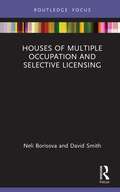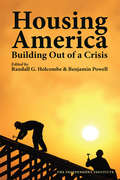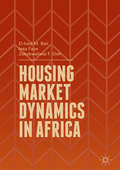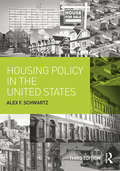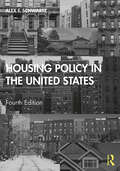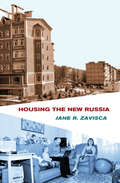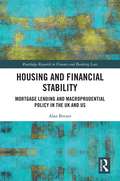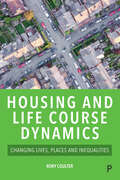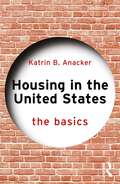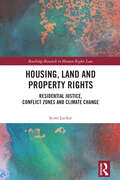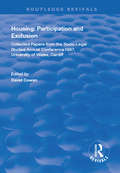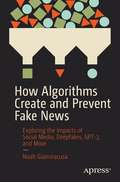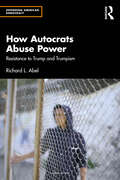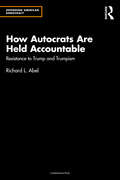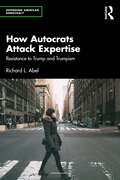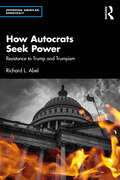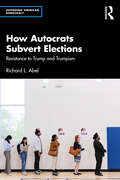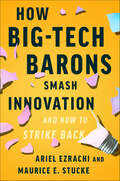- Table View
- List View
Household Waste Recycling: Household Waste Recycling (Environmental Management Set)
by Richard WaiteHouseholds in the UK each generate around one tonne of waste per year, and the successful management and disposal of this waste is becoming an increasingly important issue. In many cases, recycling is the most sensible option, and the UK government has set a target to recycle a quarter of all household waste by the year 2000. This book gives an overview of the waste management and disposal options currently available, and provides a comprehensive and up-to-date analysis of how recycling could develop. The author – one of the UK's leading experts – looks at how much of the waste is potentially recyclable, shows the various ways in which recyclable materials can be separated and reprocessed, and assesses the existing markets for recyclable materials. He gives an in-depth account of the important subject of packaging recycling, and compares the UK's progress and performance with what is happening elsewhere in Europe. He also discusses how the performance of current recycling schemes can be measured and costed, and forecasts future developments in the industry. Dr Richard Waite is a former Specialist Advisor to the House of Commons Environment Select Committee and is currently a consultant with Coopers & Lybrand. He established one of the first commercial MRFs in the country, and has advised many local authorities, central government departments (including the European Commission) and private sector organisations on recycling issues. Originally published in 1995
Houses of Multiple Occupation and Selective Licensing (Routledge Focus on Environmental Health)
by David Smith Neli BorisovaThe aim of this book is to provide a comprehensive and up-to-date overview of the law relating to houses in multiple occupation (HMOs) in part 2 of the Housing Act 2004 that local authorities environmental health practitioners use to regulate this sector. This book emerged from a set of course notes developed for a course on HMO property but took on a life of its own as the law has become increasingly complex. The law on HMOs is constantly evolving as its practical and actual application and effect on landlords is heavily dependent on the way it is interpreted by the Tribunals. This book also addresses the 2016 Housing and Planning Act, includes up-to-date key cases, and discusses how they interpret and develop the law. It also explores the limits and weaknesses of the law and the competing interpretations of key passages to illustrate where the current debates are and how they might be resolved. This book is aimed at a professional audience spread across the housing sector with enough detail to satisfy experienced environmental health and other professionals and extensive footnotes to enable further research. Other officers - housing advisers, landlords, agents - who are newer to the subject of housing law will find this a detailed introduction to the basics.
Housing America: Building Out of a Crisis (Independent Studies In Political Economy Ser.)
by Benjamin Powell Randall G. HolcombeHousing policy not only aff ects all Americans' quality of life, but has a direct impact on their fi nancial well being. About 70 percent of American households own their own homes, and for most, their homes represent the majority of their net worth. Renters are aff ected by housing policy. Even the small minority of Americans who are homeless are aff ected by housing policies specifi cally targeted to low-income individuals.The government's increasing involvement in housing markets, fed by popular demand that government "do something" to address real problems of mortgage defaults and loans, provides good reason to take a new look at the public sector in housing markets. Crises in prime mortgage lending may lower the cost of housing, but the poor and homeless cannot benefi t because of increases in unemployment. Even the private market is heavily regulated. Government policies dictate whether people can build new housing on their land, what type of housing they can build, the terms allowed in rental contracts, and much more.This volume considers the eff ects of government housing policies and what can be done to make them work better. It shows that many problems are the result of government rules and regulations. Even in a time of foreclosures, the market can still do a crucial a job of allocating resources, just as it does in other markets. Consequently, the appropriate policy response may well be to signifi cantly reduce, not increase, government presence in housing markets. Housing America is a courageous and comprehensive eff ort to examine housing policies in the United States and to show how such policies aff ect the housing market.
Housing Market Dynamics in Africa
by Issa Faye El-hadj M. Bah Zekebweliwai F. GehThis open access book utilizes new data to thoroughly analyze the main factors currently shaping the African housing market. Some of these factors include the supply and demand for housing finance, land tenure security issues, construction cost conundrum, infrastructure provision, and low-cost housing alternatives. Through detailed analysis, the authors investigate the political economy surrounding the continent’s housing market and the constraints that behind-the-scenes policy makers need to address in their attempts to provide affordable housing for the majority in need. With Africa’s urban population growing rapidly, this study highlights how broad demographic shifts and rapid urbanization are placing enormous pressure on the limited infrastructure in many cities and stretching the economic and social fabric of municipalities to their breaking point. But beyond providing a snapshot of the present conditions of the African housing market, the book offers recommendations and actionable measures for policy makers and other stakeholders on how best to provide affordable housing and alleviate Africa’s housing deficit. This work will be of particular interest to practitioners, non-governmental organizations, private sector actors, students and researchers of economic policy, international development, and urban development.
Housing Markets and Household Behavior in Japan (Advances in Japanese Business and Economics #19)
by Miki SekoThis book addresses essential questions about housing by building theoretical models based on various real world problems in Japan and testing these models using econometric methods. Almost all related empirical analyses use Japanese household longitudinal data. Accordingly, the author analyzes whole aspects of the data, based on an understanding of the actual situation, theory, and empirical analysis, to directly derive a vision of a future housing policy. Why are houses expensive and difficult to obtain in Japan? Why do people have to live in small houses? Why do people not relocate frequently? Why is the earthquake insurance subscription rate so low, particularly in an earthquake-prone country such as Japan, even after such a catastrophic event as the Great East Japan Earthquake of 2011? How do existing housing finance and tax policies or laws relate to these real world problems? To answer these questions, the book clarifies the unique criteria that characterize housing problems in Japan and presents a vision of future housing policy. The short answer is that existing housing finance policy that adopts criteria based on the floor space of houses creates incentives for people to live in even smaller houses. Furthermore, the Japan Rental Act, which affects people renting homes, reduces residential mobility. The incidence of underinsurance against earthquake risk is a result of earthquake insurance market imperfections such as crude and rough geographical risk ratings. The book elaborates on these factors in four parts and will be of interest to all readers who are concerned with the housing market and household behavior in Japan.
Housing Policy in the United States
by Alex F. SchwartzThe classic primer for its subject, Housing Policy in the United States, has been substantially revised in the wake of the 2007 near-collapse of the housing market and the nation’s recent signs of recovery. Like its previous editions, this standard volume offers a broad overview of the field, but expands to include new information on how the crisis has affected the nation’s housing challenges, and the extent to which the federal government has addressed them. Schwartz also includes the politics of austerity that has permeated almost all aspects of federal policymaking since the Congressional elections of 2010, new initiatives to rehabilitate public housing, and a new chapter on the foreclosure crisis. The latest available data on housing conditions, housing discrimination, housing finance, and programmatic expenditures is included, along with all new developments in federal housing policy. This book is the perfect foundational text for urban studies, urban planning, social policy, and housing policy courses.
Housing Policy in the United States
by Alex F. SchwartzThe fourth edition of Housing Policy in the United States refreshes its classic, foundational coverage of the field with new data, analysis, and comparative focus. This landmark volume offers a broad overview that synthesizes a wide range of material to highlight the significant problems, concepts, programs and debates that all defi ne the aims, challenges, and milestones within and involving housing policy. Expanded discussion in this edition centers on state and local activity to produce and preserve affordable housing, the impact and the implications of reduced fi nancial incentives for homeowners. Other features of this new edition include: • Analysis of the impact of the Tax Cuts and Jobs Act of 2017 on housing- related tax expenditures; • Review of the state of fair housing programs in the wake of the Trump Administration’s rollback of several key programs and policies; • Cross- examination of U.S. housing policy and conditions in an international context. Featuring the latest available data on housing patterns and conditions, this is an excellent companion for graduate and advanced undergraduate courses in urban studies, urban planning, sociology and social policy, and housing policy.
Housing Policy in the United States
by Alex F. SchwartzThe fourth edition of Housing Policy in the United States refreshes its classic, foundational coverage of the field with new data, analysis, and comparative focus. This landmark volume offers a broad overview that synthesizes a wide range of material to highlight the significant problems, concepts, programs and debates that all defi ne the aims, challenges, and milestones within and involving housing policy. Expanded discussion in this edition centers on state and local activity to produce and preserve affordable housing, the impact and the implications of reduced fi nancial incentives for homeowners.Other features of this new edition include:• Analysis of the impact of the Tax Cuts and Jobs Act of 2017 on housing- related taxexpenditures;• Review of the state of fair housing programs in the wake of the Trump Administration’s rollbackof several key programs and policies;• Cross- examination of U.S. housing policy and conditions in an international context.Featuring the latest available data on housing patterns and conditions, this is an excellent companionfor graduate and advanced undergraduate courses in urban studies, urban planning, sociologyand social policy, and housing policy.
Housing The New Russia
by Jane R. ZaviscaIn Housing the New Russia, Jane R. Zavisca examines Russia's attempts to transition from a socialist vision of housing, in which the government promised a separate, state-owned apartment for every family, to a market-based and mortgage-dependent model of home ownership. In 1992, the post-Soviet Russian government signed an agreement with the United States to create the Russian housing market. The vision of an American-style market guided housing policy over the next two decades. Privatization gave socialist housing to existing occupants, creating a nation of homeowners overnight. New financial institutions, modeled on the American mortgage system, laid the foundation for a market. Next the state tried to stimulate mortgages-and reverse the declining birth rate, another major concern-by subsidizing loans for young families. Imported housing institutions, however, failed to resonate with local conceptions of ownership, property, and rights. Most Russians reject mortgages, which they call "debt bondage," as an unjust "overpayment" for a good they consider to be a basic right. Instead of stimulating homeownership, privatization, combined with high prices and limited credit, created a system of "property without markets. " Frustrated aspirations and unjustified inequality led most Russians to call for a government-controlled housing market. Under the Soviet system, residents retained lifelong tenancy rights, perceiving the apartments they inhabited as their own. In the wake of privatization, young Russians can no longer count on the state to provide their house, nor can they afford to buy a home with wages, forcing many to live with extended family well into adulthood. Zavisca shows that the contradictions of housing policy are a significant factor in Russia's falling birth rates and the apparent failure of its pronatalist policies. These consequences further stack the deck against the likelihood that an affordable housing market will take off in the near future.
Housing and Financial Stability: Mortgage Lending and Macroprudential Policy in the UK and US (Routledge Research in Finance and Banking Law)
by Alan BrenerThis book brings together politics, law, financial services regulation, economics and housing policy in the analysis of mortgage lending and macroprudential policy in the UK and US. The book addresses the relationship between housing policy, credit and financial instability in light of the recent global financial crisis, and proposes both short and long-term solutions. Although it is not known where the next crisis will come from, history suggests that it will have credit and property at its source. Thus, it is important that the UK and other countries look more broadly at what should be done in terms of policies, institutions and tools to make the housing market and mortgage lenders more resilient against a future crisis. This book sets out a number of workable proposals. Central to this work are questions relating to the quantitative macroprudential measures, such as loan-to-value (LTV) and debt-to-income (DTI) restrictions, and whether these can be used to any significant extent in western democracies and, if employed, whether they are likely to be effective. In particular, the book questions the political legitimacy of their use and the potential consequences for the institutions, such as central banks, promulgating such policies. Preserving financial stability in very uncertain market conditions is of key importance to central bankers and other regulators, and macroprudential policy is a rapidly growing subject for both legal and economics study. This book will therefore be of interest to financial professionals, policy-makers and academics.
Housing and Life Course Dynamics: Changing Lives, Places and Inequalities
by Rory CoulterDeepening inequalities and wider processes of demographic, economic and social change are altering how people across the Global North move between homes and neighbourhoods over the lifespan. This book presents a life course framework for understanding how the changing dynamics of people’s family, education, employment and health experiences are deeply intertwined with ongoing shifts in housing behaviour and residential pathways. Particular attention is paid to how these processes help to drive uneven patterns of population change within and across neighbourhoods and localities. Integrating the latest research from multiple disciplines, the author shows how housing and life course dynamics are together reshaping 21st-century inequalities in ways that demand greater attention from scholars and public policy makers.
Housing for Hope and Wellbeing
by Flora SamuelHousing and neighbourhoods have an important contribution to make to our wellbeing and our sense of our place in the world. This book, written for a lay audience (with policy makers firmly in mind) offers a useful and intelligible overview of our housing system and why it is in ‘crisis’ while acting as an important reminder of how housing contributes to social value, defined as community, health, self development and identity. It argues for a holistic digital map-based planning system that allows for the sensitive balancing of the triple bottom line of sustainability: social, environmental and economic value. It sets out a vision of what our housing system could look like if we really put the wellbeing of people and planet first, as well as a route map on how to get there. Written primarily from the point of view of an architect, the account weaves across industry, practice and academia cross cutting disciplines to provide an integrated view of the field. The book focusses on the UK housing scene but draws on and provides lessons for housing cultures across the globe. Illustrated throughout with case studies, this is the go-to book for anyone who wants to look at housing in a holistic way.
Housing in the United States: The Basics (The Basics)
by Katrin B. AnackerHousing matters to people, be they owner, renter, housing provider, homeless individual, housing professional, or policymaker. Housing in the United States: The Basics offers an accessible introduction to key concepts and issues in housing—and a concise overview of the programs that affect housing choices, affordability, and access in the United States today. Part I covers the fundamentals of housing: households, housing units, and neighborhoods; housing as basic need vs. human right; supply and demand; construction, rehabilitation, and renovation; and demographic, socioeconomic, and cultural trends. Part II focuses on housing policy and its evolution from the early 20th century, through the Great Recession to the present day; policies related to owner- and renter-occupied housing; tax policies and expenditures; place- and people-based programs; and shortages of affordable housing.Written in a clear and engaging style, this guide allows readers to quickly grasp the complex range of policies, programs, and factors that shape the housing landscape. Essential reading for students, community advocates, homebuyers/renters, and professionals with an interest in housing, it also serves as an ideal text for introductory courses in urban planning, urban studies, sociology, public administration, architecture, and real estate.This book provides a valuable and practical foundation for informed housing discussions at the kitchen table, in the classroom, at work, or on Capitol Hill.
Housing, Land and Property Rights: Residential Justice, Conflict Zones and Climate Change (Routledge Research in Human Rights Law)
by Scott LeckieThis book explores various contemporary aspects of the growing field of housing, land and property (HLP) rights. HLP rights have undergone a major transformation in recent decades, but much remains to be done to bring their promise to the billions of people who have yet to access them. This work presents several innovative ways by which the entire field of HLP rights can be strengthened in support of those to whom they are promised by human rights laws. It outlines the author’s suggestions for creating a new World Restitution Agency, expanding our understanding of the term ‘internationally wrongful act’ to HLP crimes, the links between mine action and HLP rights in post-conflict societies and the need to include HLP issues in peace agreements. The book concludes with several chapters that outline suggestions for better addressing climate displacement, including the need for national climate land banks, the role of the courts and how to redistribute global wealth towards rehousing the millions set to be displaced from their homes and lands due to the effects of climate change. The volume will be essential reading for academics, researchers and policymakers working in the areas of international human rights law, housing, land and property issues, humanitarian issues and climate change.
Housing: Collected Papers from the Socio-Legal Studies Annual Conference 1997, University of Wales, Cardiff (Routledge Revivals)
by David CowanPublished in 1998, current themes in housing are explored in this collection of papers. The gamut of issues surrounding participation, such as tenant participation or decision-making participation, together with the forces leading to exclusion, such as in relation to ethnic minorities, are examined. The book will be relevant to all those in the housing movement together with those working in related disciplines.
How & When to Sue Your Lawyer
by John Phillips Robert W. SchachnerWhen lawyers represent a client, they have a legal obligation to act professionally, responsibly, and ethically. Unfortunately, all too many lawyers do not live up to these standards. If you have been victimized by your attorney, How & When to Sue Your Lawyeris here to help.The book begins by explaining the American Bar Association&’s categories of malpractice—substantive, administrative, client relations, and intentional wrongs. It next details the &“model rules&” of professional responsibilities established by both national and state bars, and then discusses the all-important differences between guidelines and actual laws set by legal precedent. Finally, if you feel that you have lost a case because of your counsel&’s mismanagement, or if you have been taken advantage of financially or sexually by your attorney, this book explains the necessary steps you must take to establish a solid case, from developing the facts and gathering the hard evidence to proving the allegation.
How Algorithms Create and Prevent Fake News: Exploring the Impacts of Social Media, Deepfakes, GPT-3, and More
by Noah GiansiracusaFrom deepfakes to GPT-3, deep learning is now powering a new assault on our ability to tell what’s real and what’s not, bringing a whole new algorithmic side to fake news. On the other hand, remarkable methods are being developed to help automate fact-checking and the detection of fake news and doctored media. Success in the modern business world requires you to understand these algorithmic currents, and to recognize the strengths, limits, and impacts of deep learning---especially when it comes to discerning the truth and differentiating fact from fiction. This book tells the stories of this algorithmic battle for the truth and how it impacts individuals and society at large. In doing so, it weaves together the human stories and what’s at stake here, a simplified technical background on how these algorithms work, and an accessible survey of the research literature exploring these various topics. How Algorithms Create and Prevent Fake News is an accessible, broad account of the various ways that data-driven algorithms have been distorting reality and rendering the truth harder to grasp. From news aggregators to Google searches to YouTube recommendations to Facebook news feeds, the way we obtain information today is filtered through the lens of tech giant algorithms. The way data is collected, labelled, and stored has a big impact on the machine learning algorithms that are trained on it, and this is a main source of algorithmic bias – which gets amplified in harmful data feedback loops. Don’t be afraid: with this book you’ll see the remedies and technical solutions that are being applied to oppose these harmful trends. There is hope.What You Will LearnThe ways that data labeling and storage impact machine learning and how feedback loops can occurThe history and inner-workings of YouTube’s recommendation algorithmThe state-of-the-art capabilities of AI-powered text generation (GPT-3) and video synthesis/doctoring (deepfakes) and how these technologies have been used so farThe algorithmic tools available to help with automated fact-checking and truth-detectionWho This Book is ForPeople who don’t have a technical background (in data, computers, etc.) but who would like to learn how algorithms impact society; business leaders who want to know the powers and perils of relying on artificial intelligence. A secondary audience is people with a technical background who want to explore the larger social and societal impact of their work.
How America Got Its Guns: A History of the Gun Violence Crisis
by William BriggsIn the United States more than thirty thousand deaths each year can be attributed to firearms. This book on the history of guns in America examines the Second Amendment and the laws and court cases it has spawned. The author&’s thorough and objective account shows the complexities of the issue, which are so often reduced to bumper-sticker slogans, and suggests ways in which gun violence in this country can be reduced.Briggs profiles not only protagonists in the national gun debate but also ordinary people, showing the ways guns have become part of the lives of many Americans. Among them are gays and lesbians, women, competitive trapshooters, people in the gun-rights and gun-control trenches, the NRA&’s first female president, and the most successful gunsmith in American history.Balanced and painstakingly unbiased, Briggs&’s account provides the background needed to follow gun politics in America and to understand the gun culture in which we are likely to live for the foreseeable future.
How Are We to Live?: Ethics in an Age of Self-Interest
by Peter Singerrefutes the idea that humans are by nature selfish; powerful call to live an ethical life.
How Autocrats Abuse Power: Resistance to Trump and Trumpism (Defending American Democracy)
by Richard L. AbelChronicling and analyzing resistance to the threat that autocracy poses to American liberal democracy, this book provides the definitive account of both Trump’s efforts to erode democracy’s essential elements and opposition to those efforts. This book is about the threat of autocracy, which antedated Donald Trump and will persist after he leaves the stage. Autocrats blur or breach the separation of powers, use executive orders to bypass the legislature, pack the courts, replace career prosecutors with political appointees, abuse the pardon power, and claim immunity from the law. They seek to hobble opposition from civil society by curtailing speech and assembly, tolerating and even encouraging vigilante violence, and attacking the media. As this book demonstrates, Trump followed the autocrat’s playbook in many ways. He was a huckster of hate, aiming his vitriol at women and racial minorities and making attacks on immigrants the focus of his 2016 campaign, as well as his first years in office. Nevertheless, his rhetoric and policies encountered widespread opposition—from religious leaders, business executives, lawyers and bar associations, and civil servants. His executive orders (on which he relied) were almost all struck down by courts: including the first two “Muslim bans,” the detention of children and their separation from parents, the diversion of military funds to build the border wall, the insertion of a citizenship question in the census, and the limits on asylum. Just as Trump sought to weaponize the criminal justice system against his political opponents, so he manipulated it to defend his cronies, derailing some of their prosecutions. Trump also intervened in courts martial and criminal prosecutions of those convicted of war crimes in Afghanistan and Iraq and those accused of desertion and terrorism. Again, however, there was resistance, as some career prosecutors withdrew from cases or resigned when subjected to political pressure and federal courts convicted all of Trump’s allies—even though the president went on to use his unreviewable pardon power. This book, then, documents the abuses that are characteristic of autocracy and assesses the various forms of resistance to them. This definitive account and analysis of Trumpism in action, as well as the resistance to it, will appeal to scholars, students, and others with interests in politics, populism, and the rule of law and, more specifically, to those concerned with resisting the threat that autocracy poses to liberal democracy.
How Autocrats Are Held Accountable: Resistance to Trump and Trumpism (Defending American Democracy)
by Richard L. AbelChronicling and analyzing resistance to the threat that autocracy poses to American liberal democracy, this book provides the definitive account of the roles that courts and elections played in holding Trump accountable for his actions.This book describes the many lawsuits brought against Trump and his supporters for their autocratic actions. Trump was found liable in two civil lawsuits: for nearly $100 million for sexually abusing and defaming E. Jean Carroll and for nearly $500 million for fraudulently valuing his real estate properties. Trump supporters and associates suffered even greater liabilities for defamation. And many of his lawyers were disciplined by professional associations. New York successfully prosecuted Trump for falsifying business records in connection with hush money payments to Stormy Daniels. Georgia obtained guilty pleas from four Trump associates implicated in efforts to change that state’s electoral votes, although the case against Trump was derailed by prosecutorial misconduct. Special Counsel Jack Smith initiated two prosecutions against Trump: for concealing classified papers and for seeking to overturn the 2020 election. But the Supreme Court created a novel doctrine of presidential immunity; and those cases were dismissed before Trump’s second inauguration. The book also analyzes the 2024 election, which Trump won with a bare 1.5 percent majority. It exposes his intensifying vilification of immigrants and transgender people and the numerous falsehoods he and his supporters disseminated. The book concludes by evaluating all the varied forms of resistance to autocracy described in the five volumes of the Defending American Democracy mini-series.This definitive account and analysis of Trumpism and the resistance to it will appeal to scholars, students, and others with interests in politics, populism, and the rule of law and, more specifically, to those concerned with resisting the threat that autocracy poses to liberal democracy.
How Autocrats Attack Expertise: Resistance to Trump and Trumpism (Defending American Democracy)
by Richard L. AbelChronicling and analyzing resistance to the threat that autocracy poses to American liberal democracy, this book provides the definitive account of Trump’s assault on truth and his populist attacks on expertise, as well as scientific and legal opposition to them. This book is about the threat of autocracy, which antedated Donald Trump and will persist after he leaves the stage. Pandering to populists, autocrats attack professional expertise in an Orwellian world, where “ignorance is strength” and where, as Hannah Arendt wrote, people “believe everything and nothing.” Trump sought to inflame xenophobia by blaming China for the pandemic and closing U.S. borders, then declaring victory and, when that proved premature, wrongly blaming the number of tests for escalating cases. He sought to muzzle government scientists and denounced those who defied or evaded his directives as members of the “deep state,” preferring to rely on inexpert buddies. He elevated obscure scientists who promoted quack cures and opposed effective preventive measures while sidelining the few reputable experts, who nevertheless courageously resisted political interference. In addition to these, as this book documents, independent scientists, scientific journals and professional associations also outspoken, often more so. Even the pharmaceutical industry sought to preserve the integrity of a federal bureaucracy that assured the public the drugs they consumed were safe and efficacious. Following Trump’s numerous efforts to distort and undermine expertise, this book describes and evaluates the resilience of scientific and legal defenses of truth. This definitive account and analysis of the Trump’s populist rejection of truth and expertise will appeal to scholars, students and others with interests in politics, populism and the rule of law and, more specifically, to those concerned with resisting the threat that autocracy poses to liberal democracy.
How Autocrats Seek Power: Resistance to Trump and Trumpism (Defending American Democracy)
by Richard L. AbelChronicling and analyzing resistance to the threat that autocracy poses to American liberal democracy, this book provides the definitive account of the rise of Trump’s populist support in 2016, and his failed efforts to nullify the result of the 2020 election.This book is about the threat of autocracy, which antedated Donald Trump and will persist after he leaves the stage. Autocracy negates both liberalism—which includes the protection of fundamental rights, the rule of law, separation of powers, and respect for specialist expertise—and democracy—which requires that the state be responsible to an electorate composed of all eligible voters—by concentrating unconstrained power in a single individual. Anticipating defeat in the 2016 election, Trump attacked suggestions that he had sought, or even benefited from, Russian assistance despite the evidence, and he made repeated claims of election fraud. In 2020, fearful that his mishandling of the pandemic had alienated voters, he intensified the allegations of fraud, demanding recounts, pressuring state legislatures and state election officials, advancing bizarre conspiracy theories, and finally, calling for a massive demonstration, urging protesters to march to the Capitol to pressure Congress, promising to accompany them. But as this book documents, Trump’s efforts to nullify the result of the 2020 election failed. As the courts rejected his numerous challenges, state election officials loyally performed their statutory duties, the Justice Department found no evidence of fraud, and politicians from all sides certified Biden’s victory, this book traces the many, and varied, forms of the defense of liberal democracy located within both the state and civil society, including law (judges, government lawyers, and private practitioners), the media, NGOs, science (and other forms of expertise), and civil servants (in federal, state, and local government). Evaluating their efficacy, the book maintains, is vital if—as history has repeatedly taught us—the price of liberal democracy, like that of liberty itself, is eternal vigilance.This definitive account and analysis of Trumpism and the resistance to it will appeal to scholars, students, and others with interests in politics, populism, and the rule of law and, more specifically, to those concerned with resisting the threat that autocracy poses to liberal democracy.
How Autocrats Subvert Elections: Resistance to Trump and Trumpism (Defending American Democracy)
by Richard L. AbelChronicling and analyzing resistance to the threat that autocracy poses to American liberal democracy, this book provides the definitive account of the response to the January 6, 2021, assault on the Capitol and Republican efforts to overturn the 2020 election and bias future elections in their favor.In December 2020, Donald Trump invited supporters to DC for what he promised would be a “wild” demonstration against Biden’s victory. On January 6, 2021, he directed the mob he had summoned to march on the Capitol, where it ransacked the building, caused five deaths and hundreds of injuries, and delayed but failed to prevent certification of the election. Although some Congressional Republicans briefly distanced themselves from Trump, the party quickly closed ranks around him. The business community, similarly, initially expressed criticism but soon resumed campaign contributions to Republicans. Democrats sought to impeach Trump (for the second time), but Republicans blocked conviction. Democrats created a House Select Committee, which exposed Trump’s complicity through dramatic televised hearings and a comprehensive report. Republicans responded by denying there had been a riot—one calling it a mere tourist visit—and sanctifying those arrested. Nevertheless, all but two of the nearly 1,400 charged were convicted. Judges appointed by both Democratic and Republican presidents harshly condemned the insurrectionists, imposing sentences that did not vary by the judge’s party preference. This book contextualizes these continuing threats to American democracy through an opening chapter exposing distressing parallels with the rise of Nazism in 1930s Germany. The penultimate chapter examines the ways in which Republicans persisted in seeking to overturn the 2020 election and distort subsequent elections by gerrymandering and creating obstructions to potential Democratic voters. All the chapters focus on the multiple forms of resistance—politics, social action, economic pressure, media exposure, and criminal prosecution—evaluating their relative efficacy and comparing them with modes of resistance analyzed in the author’s related volumes.This definitive account and analysis of Trump’s and his supporters’ attempts to subvert the 2020 election will appeal to scholars, students, and others with interests in politics, populism, and the rule of law, and more specifically, to those concerned with resisting the threat that autocracy poses to liberal democracy.
How Big-Tech Barons Smash Innovation—and How to Strike Back
by Ariel Ezrachi Maurice E. StuckeTwo market experts deconstruct the drivers and inhibitors to innovation in the digital economy, explain how large tech companies can stifle disruption, assess the toll of their technologies on our well-being and democracy, and outline policy changes to take power away from big tech and return it to entrepreneurs.Silicon Valley’s genius combined with limited corporate regulation promised a new age of technological innovation in which entrepreneurs would create companies that would in turn fuel unprecedented job growth. Yet disruptive innovation has stagnated even as the five leading tech giants, which account for approximately 25 percent of the S&P 500’s market capitalization, are expanding to unimaginable scale and power. In How Big-Tech Barons Smash Innovation—and How to Strike Back, Ariel Ezrachi and Maurice E. Stucke explain why this is happening and what we can do to reverse it.While many distrust the Big-Tech Barons, the prevailing belief is that innovation is thriving online. It isn’t. Rather than disruptive innovations that create significant value, we are getting technologies that primarily extract value and reduce well-being. Using vivid examples and relying on their work in the field, the authors explain how the leading tech companies design their sprawling ecosystems to extract more profits (while crushing any entrepreneur that poses a threat). As a result, we get less innovation that benefits us and more innovations that surpass the dreams of yesteryears’ autocracies. The Tech Barons’ technologies, which seek to decode our emotions and thoughts to better manipulate our behavior, are undermining political stability and democracy while fueling tribalism and hate.But it’s not hopeless. The authors reveal that sustained innovation scales with cities not companies, and that we, as a society, should profoundly alter our investment strategy and priorities to certain entrepreneurs (“Tech Pirates”) and cities’ infrastructure.

